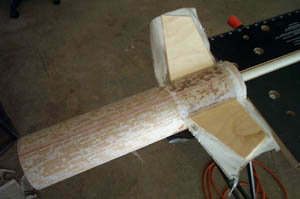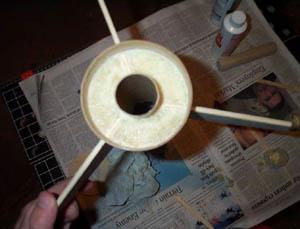| Manufacturer: | BSD High Power Rocketry  |

(by Mark A Brown - 11/20/01)
 Brief:
Brief:
The BSD Diablo is a short, fat, 3 finned rocket with a wicked look. With its
38mm motor mount, it definitely is designed for HPR. However, with a 29mm
adapter this rocket can be flown on some G motors without any problems due to
its relatively low weight.
Construction:
The kit has relatively few parts. They include: a 17" LOC style body tube,
a 20" nose cone (4" is shoulder), three 3/16" plywood fins, two
1/8 plywood centering rings, one 1/2" paper launch lug, one 8" long
38mm motor mount tube, one 1/4" eye bolt with washers and nut, one
3/16" quick link, one 30" parachute, one 4' long, 1" wide,
grommeted nylon strap, one 10' long, 1" wide elastic shock cord, and a
motor retention system that consists of two T-nuts, two 6-32 hex head bolts,
and two metal clips. I also purchased BSD's 29mm adapter with my kit.
 This is a fantastic, easy kit to build. In
fact, I had to consciously slow myself down because it is so easy to follow the
excellent instructions and assemble the excellent components that I found
myself getting too far ahead of where I should have been. All of the components
fit together well with only a little sanding of the centering rings. When I
received my kit, the body tube was not marked with the fin alignment lines or
the launch lug line. However, a quick email to Scott Binder at BSD and the
problem was resolved. Scott sent me a new body tube that had been marked and
threw in a 4" bulkhead assembly in addition. Now that's great customer
service! Having to cut the fin slots yourself is a little tedious but, not a
big deal.
This is a fantastic, easy kit to build. In
fact, I had to consciously slow myself down because it is so easy to follow the
excellent instructions and assemble the excellent components that I found
myself getting too far ahead of where I should have been. All of the components
fit together well with only a little sanding of the centering rings. When I
received my kit, the body tube was not marked with the fin alignment lines or
the launch lug line. However, a quick email to Scott Binder at BSD and the
problem was resolved. Scott sent me a new body tube that had been marked and
threw in a 4" bulkhead assembly in addition. Now that's great customer
service! Having to cut the fin slots yourself is a little tedious but, not a
big deal.
 I deviated from the instructions in a few
ways. First, when building the motor mount, I didn't secure the rear centering
ring. I did this because instead of creating internal fillets with epoxy I used
2-part expanding foam to fill the fin can. Second, after epoxying the forward
centering ring and motor mount tube in, I dry fitted the fins. With the fins in
place, I drew a pencil line on the fins along the outside body tube joint.
Thus, when I removed the fins, I had how much of the fin would be inside the
body tube. I then drilled a 5/8" hole in the center of the fin root. This
hole is to allow the expanding foam to flow through the fin root and lock it
into the fin can. I then epoxied the fins to the motor mount. Three 1 ounce
applications of 2-part foam filled the fin can. After cleaning/shaping the foam
on the rear of the fin can, the rear centering ring was attached with epoxy.
I deviated from the instructions in a few
ways. First, when building the motor mount, I didn't secure the rear centering
ring. I did this because instead of creating internal fillets with epoxy I used
2-part expanding foam to fill the fin can. Second, after epoxying the forward
centering ring and motor mount tube in, I dry fitted the fins. With the fins in
place, I drew a pencil line on the fins along the outside body tube joint.
Thus, when I removed the fins, I had how much of the fin would be inside the
body tube. I then drilled a 5/8" hole in the center of the fin root. This
hole is to allow the expanding foam to flow through the fin root and lock it
into the fin can. I then epoxied the fins to the motor mount. Three 1 ounce
applications of 2-part foam filled the fin can. After cleaning/shaping the foam
on the rear of the fin can, the rear centering ring was attached with epoxy.
My only complaint about the construction is that the motor retention comes with a separate set of instructions. If you don't read those instructions first, you won't notice the bold warning that you should install the retention hardware before assembly! Luckily, I was able to still attach the hardware after assembly.
Finishing:
Since I was planning on using this rocket for my Tripoli Level 1 certification,
I glassed the entire airframe using 2 ounce fiberglass cloth and 30 minute
slow-cure epoxy. After glassing, fillets were added to the fin/body joints and
along the launch lug using 30 minute epoxy and micro-balloon filler. Some
sanding with 80 grit sandpaper and it was ready for some primer. I used
Rustoleum gray automotive sandable primer. This primer is nice because it fills
a lot of the imperfections. Sand, prime, sand, prime. You know the drill. I
also used some Elmer's sandable wood filler putty to fill some of the larger
imperfections. Eight coats of primer later, ready for color coat. I chose
Rustoleum Safety Red. Two coats of color and then the decals. The decals were
definitely the hardest part. The decals are beautiful but, they're long,
skinny, and very sticky. A friend of mine suggested that I dip them in water
with dishwashing liquid to allow me to slide the decals in place. I was too
chicken to try though. The decals turned out OK but it takes a lot of patience.
After decals, I shot it with 2 coats of Rustoleum clear enamel.
Construction Rating: 4 out of 5
 Flight:
Flight:
The Diablo's first flight was to be my Level 1 certification flight. I had an
H128W lined up for my 29/180 casing. The clips provided with the motor
retention kit wouldn't fit with the 29mm adapter so, I had to fashion some new
clips out of some flat brass stock. When I arrived at the launch site to pick
up my motor, there was no H128 to be found! Thankfully, the vendor had some
H165 Redline motors that would do just fine. I used a Top Flight Kevlar®
chute protector and shock cord protector instead of wadding. The H165 was
prepped with a 10 second delay and placed on a 3/8" launch rod. That
Redline will move fast! It boosted straight up to probably just over 2000 feet.
It was a beautiful launch.!
Recovery:
I tied loops into both ends of the elastic shock cord and one loop about 1/4
from one end. These loops were used to attach the elastic to the nylon strap,
the nose cone, and the parachute using quick links. I also included a swivel to
keep the chute shroud lines from tangling. The recovery system worked great.
The descent was a bit fast but, that's probably because my rocket is towards
the upper end of BSD's expected weight. A bit larger chute could solve this
but, I'm happy with the faster descent. The glassing that I did makes it able
to withstand a rougher landing and I get less wind drift this way.
Flight Rating: 5 out of 5
Summary:
I love this rocket. The main pro's are it's ease of building, the clear
instructions, and the tremendous customer support that you get from BSD. The
main con's are the separate instructions for motor retention and the retention
system's inability to accommodate the 29mm adapter.
Overall Rating: 5 out of 5
Other Reviews
- BSD High Power Rocketry Diablo By Nick Esselman
(05/25/00) Recently BSD High Power Rocketry has started selling kits again and although they are a new name, they are not new to rocketry. BSD is run by Scott Binder who initially designed all of the Binder Design kits. So, now operating under BSD High Power Rocketry, Scott is offering several kits but one in particular caught my eye. The Diablo. It is what I call a "stubby" ...
 |
 |
Flights
 |
 |
M.S.W. (May 14, 2002)
 |
 |
C.P.C. (January 7, 2002)